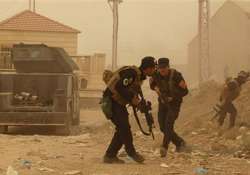Islamic State seizes government compound in Iraq's Ramadi
Baghdad: Islamic State militants seized the main government headquarters in Ramadi, raising their black flag over the compound and setting it ablaze hours after a series of suicide car bombings heralded the start of a

Baghdad: Islamic State militants seized the main government headquarters in Ramadi, raising their black flag over the compound and setting it ablaze hours after a series of suicide car bombings heralded the start of a major new offensive by the extremists on the strategic city.
The advance marked a significant setback for the Iraqi government in its long fight to defend Ramadi, the capital of western Anbar province, where Iraqi forces have made little progress against the extremist group despite months of U.S.-led airstrikes.
The capture of the compound which houses a police headquarters as well as provincial and municipal offices followed a coordinated attack in which three near-simultaneous suicide car bombs killed at least 10 police officers and wounded dozens more, Ramadi's Mayor Dalaf al-Kubaisi said. He said two Humvees previously seized from the Iraqi army were used in the attack.
Islamic State fighters also seized other parts of the city and attacked the Anbar Operation Command, the military headquarters for the province, al-Kubaisi said.
As they advanced, the militants carried out mass killings in which dozens of captured security forces and their families were slain, said Anbar provincial councilman Taha Abdul-Ghani.
The victims included some 30 tribal fighters allied with the Iraqi forces in the battle against IS, said another councilman, Athal al-Fahdawi. In the Jamiaa district of Ramadi, IS gunmen stormed the house of a policeman, Ahmed Mohammed, and shot him dead along with his wife, 12-year-old son and 4-year-old daughter.
Dozens of families were forced to flee their homes in the area, al-Fahdawi said.
The head of Anbar's provincial council, Sabah Karhout, appealed to the central government in Baghdad to send reinforcements and urged the U.S.-led coalition to increase airstrikes against the militants in Ramadi.
"The city is undergoing vicious attack by Daesh and we are in dire need of any kind of assistance," Karhout said, using an Arabic acronym for the Islamic State group.
In Washington, State Department spokesman Jeff Rathke said the U.S. conducted "numerous airstrikes" in Ramadi on Friday as part of its support for Iraqi security forces fighting the Islamic State group.
"There will be good days and bad days in Iraq," Rathke told reporters. "ISIL is trying to make today a bad day in Ramadi. We've said all along we see this as a long-term fight."
U.S. troops saw some of the heaviest fighting of the eight-year Iraq war in the sprawling desert province of Anbar, and Ramadi was a major insurgent stronghold. The IS group captured the nearby city of Fallujah and parts of Ramadi in January 2014, two years after U.S. forces withdrew and months before its main sweep across northern and western Iraq last summer.
A senior U.S. military officer downplayed the militants' latest gains in Ramadi, saying they were temporary and unlikely to withstand Iraqi counterattacks.
While conceding the extremists had executed a "complex attack" on the city, Marine Brig. Gen. Thomas D. Weidley said Iraqi security forces still controlled most of the key facilities, infrastructure and roadways in the Ramadi area.
Speaking by telephone from his headquarters in Kuwait, Weidley, the chief of staff for the U.S. command leading the campaign against the IS group, suggested the militants were trying to inflate the significance of what he called limited gains in Ramadi.
"Daesh does remain on the defensive," he said. "We've seen similar attacks in Ramadi over the last several months which the (Iraqi security forces) have been able to repel, and we see this one being similar to those."
In Baghdad, Iraqi Prime Minister Haider al-Abadi presided over a meeting of senior security and military commanders to discuss the situation in Ramadi.
"His excellency gave orders to exert more efforts in the fighting against Daesh and in order to drive out the terrorist gangs from Ramadi," said a statement posted on al-Abadi's official website.
State-run Iraqiya television announced that new combat units had arrived in Ramadi.
Iraqi forces and Kurdish fighters have made steady gains against the IS group elsewhere in Iraq since last summer, when the U.S.-led coalition began striking the extremists from the air. Iraqi forces and Shiite militias recaptured the northern city of Tikrit from the IS group early last month, marking their biggest victory to date.
But progress has been slow in Anbar, a vast Sunni province where anger at the Shiite-led government runs deep and where U.S. forces struggled for years to beat back a potent insurgency. American soldiers fought some of their bloodiest battles since Vietnam on the streets of Fallujah and Ramadi.
U.S. troops were able to improve security in the province starting in 2006 when powerful tribes and former militants turned against al-Qaida in Iraq, a precursor to the Islamic State group, and allied with the Americans.
But the so-called Sunni Awakening movement waned in the years after U.S. troops withdrew at the end of 2011, with the fighters complaining of neglect and distrust from the Shiite-led government in Baghdad.